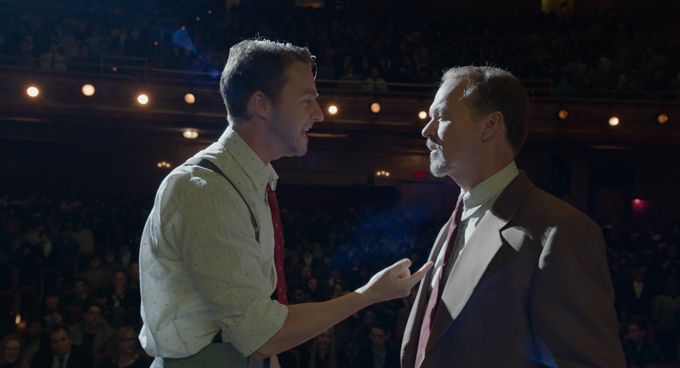What makes this musical stand out so much is its approach. Sure, it has many of the same morals as the animated Disney classics you grew up on, but Into the Woods perfectly meshes the classic and contemporary - offering stories of love, bravery, parenthood, and loyalty with the heart and laughs that no one in the 21st century can complain about.
Director Rob Marshall brings out the best possible performances from his impeccably casted troupe of actors. Ranging from the young to the old, every member of Into the Woods's cast delivers a performance that balances passion and professionalism in a manner that I have not so often seen. Daniel Huttlestone (one of the only good aspects of 2012's Les Mis) and Lilla Crawford play Jack and Red Riding Hood with skill beyond their years. There's a strong level of confidence that exudes from Crawford, while Huttlestone has outdone himself in yet another musical, securing his place in a legacy of motion picture sing-a-longs for years to come.
And let's not forget about the veteran performers. Meryl Streep, though underused, shines as The Witch, and while I don't see it as warranted, looks pretty solid to posit her 19th Academy Award nomination. Personally, I'd like to see a nod for Anna Kendrick's lovely performance as Cinderella, or Emily Blunt, who as The Baker's Wife does her best work since The Devil Wears Prada. Though any of the cast, including Streep, or even Chris Pine as The Prince, would be fully deserving of any award or nomination received. Their comedic timing is fully on point, and so not only is this the best musical of the year, but also the best comedy. Among these features, the film is bolstered by astounding art direction and cinematography.
Into the Woods is complete magical fun from the very first minute to the very last, offering a complete immersion into its music-filled fantastical universe. Despite being a PG-rated Disney musical, Into the Woods truly is for everyone - not just little kids and girls. Put away your pride, boys. There's nothin' wrong with a couple of bros going to watch a great movie musical, especially when it's as hilarious and well-made as this one.
Rating: 5/5
Into the Woods is complete magical fun from the very first minute to the very last, offering a complete immersion into its music-filled fantastical universe. Despite being a PG-rated Disney musical, Into the Woods truly is for everyone - not just little kids and girls. Put away your pride, boys. There's nothin' wrong with a couple of bros going to watch a great movie musical, especially when it's as hilarious and well-made as this one.
Rating: 5/5










